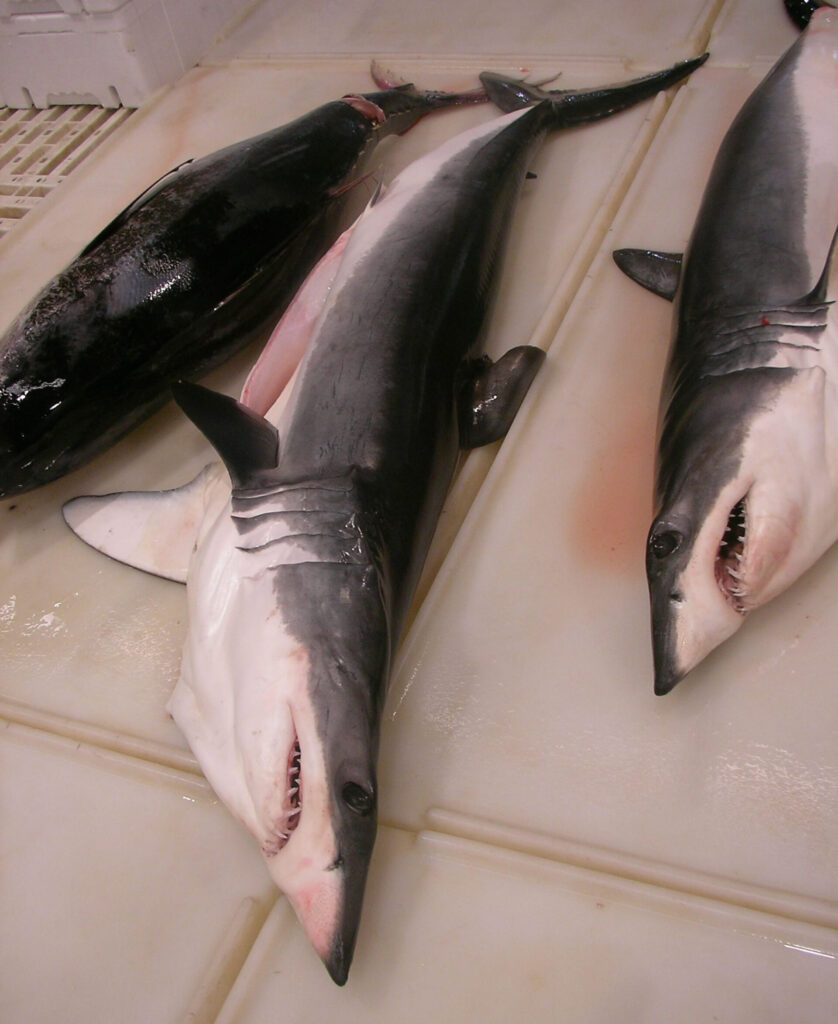
By John Baker, WildAid President and Chief Program Officer
Sharks are in trouble, and we need them to thrive.
The fiftieth anniversary of the film “Jaws,” as well as David Attenborough’s powerful new film “Ocean,” have together put sharks back in the global spotlight. Unfortunately, it’s sad for me to say (again): sharks are in serious, and mounting trouble.
Sharks are considered some of our planet’s most at-risk animals. Global populations of sharks and rays have fallen by around 50% over the last 50 years, putting 37% of species at risk of extinction. But today, the threats are both increasing and rapidly changing.
Historically, the main issue has been excessive consumption of shark fin soup, particularly in Southeast and East Asia. The problem has now become global, as demand for shark meat is growing rapidly around the world, making this an urgent and more complex matter.”
Healthy oceans need sharks
Sharks are the tigers of the ocean, predators that play a vital role in maintaining the health of the ecosystems they inhabit. Just as big cats regulate animal populations on land, sharks keep the oceans in check and in balance. As apex predators, reef sharks limit parrot fish populations, preventing the over-grazing of coral reefs. Tiger sharks keep sea turtles from depleting the Bahamas’ extensive sea grass beds. Removing these predators puts these ecosystems under additional pressures, right at a time when they can least afford it, as they face the negative impact of rising sea temperatures and ocean acidification.
Sharks are still in decline, but the threats have changed
A decade ago, a landmark study estimated that we humans were killing up to 100 million sharks a year, and that as many as 73% were killed for their fins. Thankfully, consumption of shark fin soup in some of the biggest markets like mainland China has declined significantly. In fact, WildAid’s campaigns with Jackie Chan and Yao Ming (among others) helped to reduce shark fin consumption in mainland China by about 80% since 2011.


The bad news is that the same researcher, Dr. Boris Worm at Dalhousie University, published an updated study in Nature last year showing that we humans are still killing about 100 million sharks per year but now, a decade later, most of these are killed for their meat and other products. With declining fish stocks and economic shifts, many of the shark carcasses previously discarded at sea after removing the valuable fins are now retained and sold to supply our consumption of fish and chips in the UK and Australia, mislabeled fish in the EU, and even pet food, cosmetics, and other products around the world. Essentially, global shark fishing mortality is moving away from finning of larger pelagic species toward full use of smaller coastal species, presenting new regulatory and conservation challenges.
As other fisheries decline, shark meat has become a substitute for other valuable fish: salted cod, commonly imported from Norway to Brazil, is now being replaced by locally sourced shark meat. Dr. Worm’s co-author Leonardo Feitosa, a shark biologist from Brazil now working at UC Santa Barbara, explained: “We have seen the demand for shark fins decreasing and the demand for shark meat increasing, with Brazil and Italy being the main consumers. Because shark meat is a relatively cheap substitute for other types of fish, there is considerable mislabeling, making some consumers eat shark meat without their knowledge.”
A WWF report from 2021 estimated that the global trade in shark and ray meat was worth $2.6 billion in 2019, a dramatic 5.8x increase in just 8 years from $379.8 million in 2011.
One example of this is seen in a group of coastal sharks most people have not heard much about, the smooth-hounds (cousins of dogfish). They are now under the spotlight as their high-value meat is widely consumed in Australia, the European Union, South Africa, Uruguay, and Argentina. The common smooth-hound remains largely unmanaged across most of its range, where fisheries governance is weak or underdeveloped.
And, yes, there are still some consumers seeking shark fin soup for their weddings and family celebrations, such as in Thailand. There, WildAid campaigns have reduced consumption by 34% since 2018, but there is still more work to do.
Sharks are fish, but they are not highly reproductive like cod or tuna that spawn thousands of offspring each year. Sharks have an extremely low intrinsic population growth rate, giving birth to 8-12 live babies each year, and thus cannot possibly keep up with our massive fishing pressure.


What needs to be done to save sharks
We are making progress, such as the recent protections for over 50 species of requiem sharks and all hammerhead shark species gained under CITES in 2022, but we need more systemic responses to stem the overwhelming scale of human-caused mortality. There’s a long list of actions we must prioritize:
- Continue to strengthen regulations restricting international trade in sharks as outlined in the 7 new proposals for 70 species at the upcoming CITES Conference of the Parties (CoP) meeting in November, including whale sharks, oceanic white tip sharks, the smooth-hound shark family, and manta and devil rays, among others,
- Protect sharks (and all fish) as marine wildlife and address trafficking of marine wildlife through the international criminal law framework, along with all other wildlife crimes, as currently in discussion under the UN Treaty on Organized Crime, as John Scanlon and the Global Initiative to End Wildlife Crime proposes,
- Strengthen protections for sharks in national laws, including expanding policies beyond the focus on finning alone to address shark mortality — and enforce them effectively,
- Protect critical habitats with effective marine reserves,
- Strengthen fishery management and enforcement of illegal fishing,
- Increase supply chain transparency and reduce mislabeling, and
- Reduce demand for shark products and build public support for shark conservation, sustainable fisheries, and healthy oceans.
Without more urgency in addressing the threats to sharks, their populations will continue to decline. Much of this is not yet well understood by policymakers, business leaders, or the general public, though so many of us are fascinated by these animals. We need to bring sharks into view, connect people with them even more, and elevate them as icons for healthy oceans, just as we see tigers and lions as majestic lords of the forest and savanna. Who would ever want to eat a tiger? The thought would sicken most of us, yet here we are eating the ocean’s tigers without even knowing it.
WildAid aims to address these needs by forming a new initiative, bringing together our globally recognized marine and wildlife programs and like-minded partners, to give sharks the respect and protection they need. They need us, and we need them. Please join us!
Get the latest updates on WildAid’s shark conservation work, ways to help wildlife, and stories from our projects around the world. Sign up for our email list here!
Stay in touch and get the latest WildAid updates.
SIGN UP
